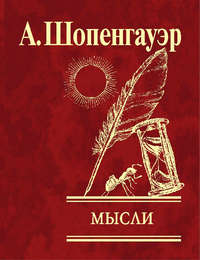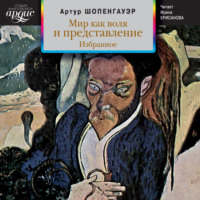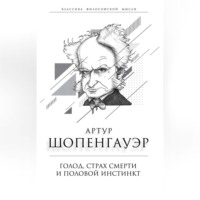 полная версия
полная версияThe World as Will and Idea (Vol. 2 of 3)
That the return to an unconditioned cause, to a first beginning, by no means lies in the nature of reason, is, moreover, practically proved by the fact that the primitive religions of our race, which even yet have the greatest number of followers upon earth, Brahmanism and Buddhaism, neither know nor admit such assumptions, but carry the series of phenomena conditioning each other into infinity. Upon this point, I refer to the note appended to the criticism of the first antinomy, which occurs further on; and the reader may also see Upham's “Doctrine of Buddhaism” (p. 9), and in general all genuine accounts of the religions of Asia. Judaism and reason ought not to be identified.
Kant, who by no means desires to maintain his pretended principle of reason as objectively valid, but merely as subjectively necessary, deduces it even as such only by means of a shallow sophism, p. 307; V. 364. He says that because we seek to subsume every truth known to us under a more general truth, as far as this process can be carried, this is nothing else than the pursuit of the unconditioned, which we already presuppose. But, in truth, in this endeavour we do nothing more than apply reason, and intentionally make use of it to simplify our knowledge by enabling us to survey it – reason, which is that faculty of abstract, general knowledge that distinguishes the reflective, thinking man, endowed with speech, from the brute, which is the slave of the present. For the use of reason just consists in this, that we know the particular through the universal, the case through the rule, the rule through the more general rule; thus that we seek the most general points of view. Through such survey or general view our knowledge is so facilitated and perfected that from it arises the great difference between the life of the brutes and that of men, and again between the life of educated and that of uneducated men. Now, certainly the series of grounds of knowledge, which exist only in the sphere of the abstract, thus of reason, always finds an end in what is indemonstrable, i. e., in an idea which is not further conditioned according to this form of the principle of sufficient reason, thus in the a priori or a posteriori directly perceptible ground of the first proposition of the train of reasoning. I have already shown in the essay on the principle of sufficient reason, § 50, that here the series of grounds of knowledge really passes over into grounds of becoming or of being. But one can only desire to make this circumstance hold good as a proof of an unconditioned according to the law of causality, or even of the mere demand for such an unconditioned, if one has not yet distinguished the forms of the principle of sufficient reason at all, but, holding to the abstract expression, has confounded them all. Kant, however, seeks to establish that confusion, through a mere play upon words, with Universalitas and Universitas, p. 322; V. 379. Thus it is fundamentally false that our search for higher grounds of knowledge, more general truths, springs from the presupposition of an object unconditioned in its being, or has anything whatever in common with this. Moreover, how should it be essential to the reason to presuppose something which it must know to be an absurdity as soon as it reflects? The source of that conception of the unconditioned is rather to be found only in the indolence of the individual who wishes by means of it to get rid of all further questions, whether his own or of others, though entirely without justification.
Now Kant himself denies objective validity to this pretended principle of reason; he gives it, however, as a necessary subjective assumption, and thus introduces an irremediable split into our knowledge, which he soon allows to appear more clearly. With this purpose he unfolds that principle of reason further, p. 322; V. 379, in accordance with the method of architectonic symmetry of which he is so fond. From the three categories of relation spring three kinds of syllogisms, each of which gives the clue for the discovery of a special unconditioned, of which again there are three: the soul, the world (as an object in itself and absolute totality), and God. Now here we must at once note a great contradiction, of which Kant, however, takes no notice, because it would be very dangerous to the symmetry. Two of these unconditioneds are themselves conditioned by the third, the soul and the world by God, who is the cause of their existence. Thus the two former have by no means the predicate of unconditionedness in common with the latter, though this is really the point here, but only that of inferred being according to the principles of experience, beyond the sphere of the possibility of experience.
Setting this aside, we recognise in the three unconditioneds, to which, according to Kant, reason, following its essential laws, must come, the three principal subjects round which the whole of philosophy under the influence of Christianity, from the Scholastics down to Christian Wolf, has turned. Accessible and familiar as these conceptions have become through all these philosophers, and now also through the philosophers of pure reason, this by no means shows that, without revelation, they would necessarily have proceeded from the development of all reason as a production peculiar to its very nature. In order to prove this it would be necessary to call in the aid of historical criticism, and to examine whether the ancient and non-European nations, especially the peoples of Hindostan and many of the oldest Greek philosophers, really attained to those conceptions, or whether it is only we who, by quite falsely translating the Brahma of the Hindus and the Tien of the Chinese as “God,” good-naturedly attribute such conceptions to them, just as the Greeks recognised their gods everywhere; whether it is not rather the case that theism proper is only to be found in the religion of the Jews, and in the two religions which have proceeded from it, whose followers just on this account comprise the adherents of all other religions on earth under the name of heathen, which, by the way, is a most absurd and crude expression, and ought to be banished at least from the writings of the learned, because it identifies and jumbles together Brahmanists, Buddhists, Egyptians, Greeks, Romans, Germans, Gauls, Iroquois, Patagonians, Caribbeans, Otaheiteans, Australians, and many others. Such an expression is all very well for priests, but in the learned world it must at once be shown the door: it can go to England and take up its abode at Oxford. It is a thoroughly established fact that Buddhism, the religion which numbers more followers than any other on earth, contains absolutely no theism, indeed rejects it. As regards Plato, it is my opinion that he owes to the Jews the theism with which he is periodically seized. On this account Numenius (according to Clem. Alex., Strom., i. c. 22, Euseb. præp. evang., xiii. 12, and Suidas under Numenius) called him the Moses græcisans: Τι γαρ εστι Πλατων, η Μωσης αττικιζων; and he accuses him of having stolen (αποσυλησας) his doctrine of God and the creation from the Mosaical writings. Clemens often repeats that Plato knew and made use of Moses, e. g., Strom., i. 25. – v. c. 14, § 90, &c., &c.; Pædagog., ii. 10, and iii. 11; also in the Cohortatio ad gentes, c. 6, where, after he has bitterly censured and derided the whole of the Greek philosophers in the preceding chapter because they were not Jews, he bestows on Plato nothing but praise, and breaks out into pure exultation that as Plato had learnt his geometry from the Egyptians, his astronomy from the Babylonians, magic from the Thracians, and much also from the Assyrians, so he had learnt his theism from the Jews: Οιδα σου τους διδασκαλους, καν αποκρυπτειν εθελῇς, … δοξαν την του θεου παρ᾽ αυτων ωφελησει των Εβραιων (Tuos magistros novi, licet eos celare velis, … illa de Deo sententia suppeditata tibi est ab Hebræis). A pathetic scene of recognition. But I see a remarkable confirmation of the matter in what follows. According to Plutarch (in Mario), and, better, according to Lactantius (i. 3, 19), Plato thanked Nature that he had been born a human being and not a brute, a man and not a woman, a Greek and not a barbarian. Now in Isaac Euchel's “Prayers of the Jews,” from the Hebrew, second edition, 1799, p. 7, there is a morning prayer in which God is thanked and praised that the worshipper was born a Jew and not a heathen, a free man and not a slave, a man and not a woman. Such an historical investigation would have spared Kant an unfortunate necessity in which he now becomes involved, in that he makes these three conceptions spring necessarily from the nature of reason, and yet explains that they are untenable and unverifiable by the reason, and thus makes the reason itself a sophisticator; for he says, p. 339; V. 397: “There are sophistications, not of man, but of pure reason itself, from which even the wisest cannot free himself, and although after much trouble he may be able to avoid error, yet he never can escape from the illusion which unceasingly torments and mocks him.” Therefore these Kantian “Ideas of the Reason” might be compared to the focus in which the converging reflected rays from a concave mirror meet several inches before its surface, in consequence of which, by an inevitable process of the understanding, an object presents itself to us there which is a thing without reality.
But the name “Idea” is very unfortunately chosen for these pretended necessary productions of the pure theoretical reason, and violently appropriated from Plato, who used it to denote the eternal forms which, multiplied through space and time, become partially visible in the innumerable individual fleeting things. Plato's “Ideas” are accordingly throughout perceptible, as indeed the word which he chose so definitely signifies, for it could only be adequately translated by means of perceptible or visible things; and Kant has appropriated it to denote that which lies so far from all possibility of perception that even abstract thought can only half attain to it. The word “Idea,” which Plato first introduced, has, moreover, since then, through two-and-twenty centuries, always retained the significance in which he used it; for not only all ancient philosophers, but also all the Scholastics, and indeed the Church Fathers and the theologians of the Middle Ages, used it only in that Platonic sense, the sense of the Latin word exemplar, as Suarez expressly mentions in his twenty-fifth Disputation, sect. 1. That Englishmen and Frenchmen were later induced by the poverty of their languages to misuse this word is bad enough, but not of importance. Kant's misuse of the word idea, by the substitution of a new significance introduced by means of the slender clue of not being object of experience, which it has in common with Plato's ideas, but also in common with every possible chimera, is thus altogether unjustifiable. Now, since the misuse of a few years is not to be considered against the authority of many centuries, I have always used the word in its old, original, Platonic significance.
The refutation of rational psychology is much fuller and more thorough in the first edition of the “Critique of Pure Reason” than in the second and following editions, and therefore upon this point we must make use of the first edition exclusively. This refutation has as a whole very great merit and much truth. Yet I am clearly of the opinion that it was merely from his love of symmetry that Kant deduced as necessary the conception of the soul from the paralogism of substantiality by applying the demand for the unconditioned to the conception substance, which is the first category of relation, and accordingly maintained that the conception of a soul arose in this way in every speculative reason. If this conception really had its origin in the presupposition of a final subject of all predicates of a thing, one would have assumed a soul not in men alone, but also just as necessarily in every lifeless thing, for such a thing also requires a final subject of all its predicates. Speaking generally, however, Kant makes use of a quite inadmissible expression when he talks of something which can exist only as subject and not as predicate (e. g., Critique of Pure Reason, p. 323; V. 412; Prolegomena, § 4 and 47); though a precedent for this is to be found in Aristotle's “Metaphysics,” iv. ch. 8. Nothing whatever exists as subject and predicate, for these expressions belong exclusively to logic, and denote the relations of abstract conceptions to each other. Now their correlative or representative in the world of perception must be substance and accident. But then we need not look further for that which exists always as substance and never as accident, but have it directly in matter. It is the substance corresponding to all properties of things which are their accidents. It is, in fact, if one wishes to retain the expression of Kant which has just been condemned, the final subject of all predicates of that empirically given thing, that which remains after the abstraction of all its properties of every kind. And this holds good of man as of a brute, a plant, or a stone, and is so evident, that in order not to see it a determined desire not to see is required. That it is really the prototype of the conception substance, I will show soon. But subject and predicate are related to substance and accident rather as the principle of sufficient reason in logic to the law of causality in nature, and the substitution or identification of the former is just as inadmissible as that of the latter. Yet in the “Prolegomena,” § 46, Kant carries this substitution and identification to its fullest extent in order to make the conception of the soul arise from that of the final subject of all predicates and from the form of the categorical syllogism. In order to discover the sophistical nature of this paragraph, one only needs to reflect that subject and predicate are purely logical determinations, which concern abstract conceptions solely and alone, and that according to their relation in the judgment. Substance and accident, on the other hand, belong to the world of perception and its apprehension in the understanding, and are even there only as identical with matter and form or quality. Of this more shortly.
The antithesis which has given occasion for the assumption of two fundamentally different substances, body and soul, is in truth that of objective and subjective. If a man apprehends himself objectively in external perception, he finds a being extended in space and in general merely corporeal; but if, on the other hand, he apprehends himself in mere self-consciousness, thus purely subjectively, he finds himself a merely willing and perceiving being, free from all forms of perception, thus also without a single one of the properties which belong to bodies. Now he forms the conception of the soul, like all the transcendental conceptions called by Kant Ideas, by applying the principle of sufficient reason, the form of all objects, to that which is not an object, and in this case indeed to the subject of knowing and willing. He treats, in fact, knowing, thinking, and willing as effects of which he seeks the cause, and as he cannot accept the body as their cause, he assumes a cause of them entirely different from the body. In this manner the first and the last of the dogmatists proves the existence of the soul: Plato in the “Phædrus” and also Wolf: from thinking and willing as the effects which lead to that cause. Only after in this way, by hypostatising a cause corresponding to the effect, the conception of an immaterial, simple, indestructible being had arisen, the school developed and demonstrated this from the conception of substance. But this conception itself they had previously constructed specially for this purpose by the following artifice, which is worthy of notice.
With the first class of ideas, i. e., the real world of perception, the idea of matter is also given; because the law governing this class of ideas, the law of causality, determines the change of the states or conditions, and these conditions themselves presuppose something permanent, whose changes they are. When speaking above of the principle of the permanence of substance, I showed, by reference to earlier passages, that this idea of matter arises because in the understanding, for which alone it exists, time and space are intimately united, and the share of space in this product exhibits itself as the permanence of matter, while the share of time appears as the change of states. Purely in itself, matter can only be thought in abstracto, and not perceived; for to perception it always appears already in form and quality. From this conception of matter, substance is again an abstraction, consequently a higher genus, and arose in this way. Of the conception of matter, only the predicate of permanence was allowed to remain, while all its other essential properties, extension, impenetrability, divisibility, &c., were thought away. Like every higher genus, then, the concept substance contains less in itself than the concept matter, but, unlike every other higher genus, it does not contain more under it, because it does not include several lower genera besides matter; but this remains the one true species of the concept substance, the only assignable thing by which its content is realised and receives a proof. Thus the aim with which in other cases the reason produces by abstraction a higher conception, in order that in it several subordinate species may be thought at once through common determinations, has here no place; consequently that abstraction is either undertaken idly and entirely without aim, or it has a secret secondary purpose. This secret purpose is now brought to light; for under the conception substance, along with its true sub-species matter, a second species is co-ordinated – the immaterial, simple, indestructible substance, soul. But the surreptitious introduction of this last concept arose from the fact that the higher concept substance was framed illogically, and in a manner contrary to law. In its legitimate procedure the reason always frames the concept of a higher genus by placing together the concepts of several species, and now comparing them, proceeds discursively, and by omitting their differences and retaining the qualities in which they agree, obtains the generic concept which includes them all but has a smaller content. From this it follows that the concepts of the species must always precede the concept of the genus. But, in the present case, the converse is true. Only the concept matter existed before the generic concept substance. The latter was without occasion, and consequently without justification, as it were aimlessly framed from the former by the arbitrary omission of all its determinations except one. Not till afterwards was the second ungenuine species placed beside the concept matter, and so foisted in. But for the framing of this second concept nothing more was now required than an express denial of what had already been tacitly omitted in the higher generic concept, extension, impenetrability, and divisibility. Thus the concept substance was framed merely to be the vehicle for the surreptitious introduction of the concept of the immaterial substance. Consequently, it is very far from being capable of holding good as a category or necessary function of the understanding; rather is it an exceedingly superfluous concept, because its only true content lies already in the concept of matter, besides which it contains only a great void, which can be filled up by nothing but the illicitly introduced species immaterial substance; and, indeed, it was solely for the purpose of containing this that it was framed. Accordingly, in strictness, the concept substance must be entirely rejected, and the concept matter everywhere put in its place.
The categories were a procrustean bed for every possible thing, but the three kinds of syllogisms are so only for the three so-called Ideas. The Idea of the soul was compelled to find its origin in the form of the categorical syllogism. It is now the turn of the dogmatic ideas concerning the universe, so far as it is thought as an object in itself, between two limits – that of the smallest (atom), and that of the largest (limits of the universe in time and space). These must now proceed from the form of the hypothetical syllogism. Nor for this in itself is any special violence necessary. For the hypothetical judgment has its form from the principle of sufficient reason, and not the cosmological alone but all those so-called Ideas really have their origin in the inconsiderate and unrestricted application of that principle, and the laying aside of it at pleasure. For, in accordance with that principle, the mere dependence of an object upon another is ever sought for, till finally the exhaustion of the imagination puts an end to the journey; and thus it is lost sight of that every object, and indeed the whole chain of objects and the principle of sufficient reason itself, stand in a far closer and greater dependence, the dependence upon the knowing subject, for whose objects alone, i. e., ideas, that principle is valid, for their mere position in space and time is determined by it. Thus, since the form of knowledge from which here merely the cosmological Ideas are derived, the principle of sufficient reason, is the source of all subtle hypostases, in this case no sophisms need be resorted to; but so much the more is sophistry required in order to classify those Ideas according to the four titles of the categories.
(1.) The cosmological Ideas with regard to time and space, thus of the limits of the world in both, are boldly regarded as determined through the category of quantity, with which they clearly have nothing in common, except the accidental denotation in logic of the extent of the concept of the subject in the judgment by the word quantity, a pictorial expression instead of which some other might just as well have been chosen. But for Kant's love of symmetry this is enough. He takes advantage of the fortunate accident of this nomenclature, and links to it the transcendent dogmas of the world's extension.
(2.) Yet more boldly does Kant link to quality, i. e., the affirmation or negation in a judgment, the transcendent Ideas concerning matter; a procedure which has not even an accidental similarity of words as a basis. For it is just to the quantity, and not to the quality of matter that its mechanical (not chemical) divisibility is related. But, what is more, this whole idea of divisibility by no means belongs to those inferences according to the principle of sufficient reason, from which, however, as the content of the hypothetical form, all cosmological Ideas ought to flow. For the assertion upon which Kant there relies, that the relation of the parts to the whole is that of the condition to the conditioned, thus a relation according to the principle of sufficient reason, is certainly an ingenious but yet a groundless sophism. That relation is rather based upon the principle of contradiction; for the whole is not through the part, nor the parts through the whole, but both are necessarily together because they are one, and their separation is only an arbitrary act. It depends upon this, according to the principle of contradiction, that if the parts are thought away, the whole is also thought away, and conversely; and by no means upon the fact that the parts as the reason conditioned the whole as the consequent, and that therefore, in accordance with the principle of sufficient reason, we were necessarily led to seek the ultimate parts, in order, as its reason, to understand from them the whole. Such great difficulties are here overcome by the love of symmetry.
(3.) The Idea of the first cause of the world would now quite properly come under the title of relation; but Kant must reserve this for the fourth title, that of modality, for which otherwise nothing would remain, and under which he forces this idea to come by saying that the contingent (i. e., according to his explanation, which is diametrically opposed to the truth, every consequent of its reason) becomes the necessary through the first cause. Therefore, for the sake of symmetry, the conception of freedom appears here as the third Idea. By this conception, however, as is distinctly stated in the observations on the thesis of the third conflict, what is really meant is only that Idea of the cause of the world which alone is admissible here. The third and fourth conflicts are at bottom tautological.









